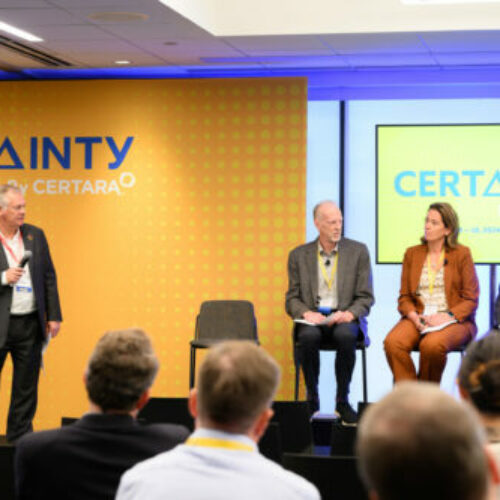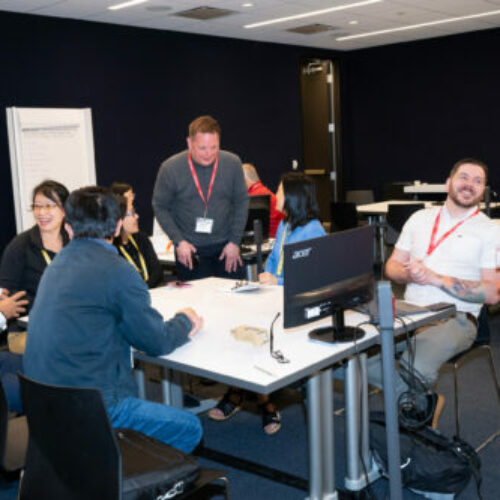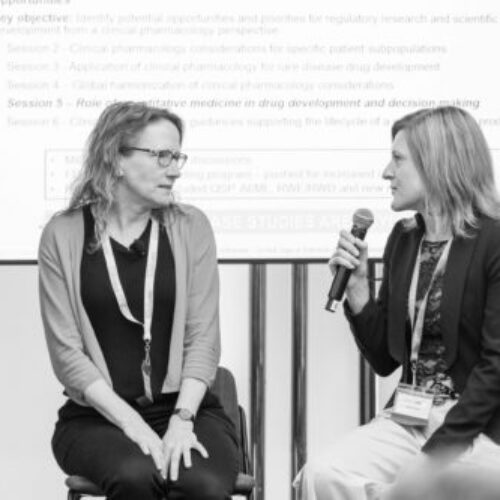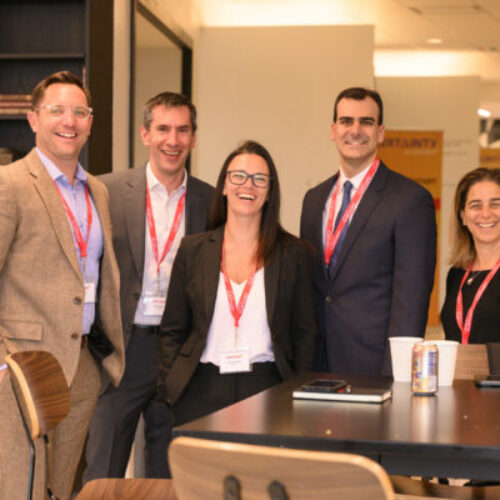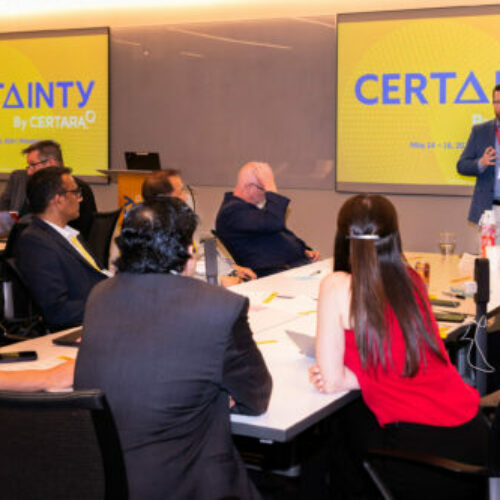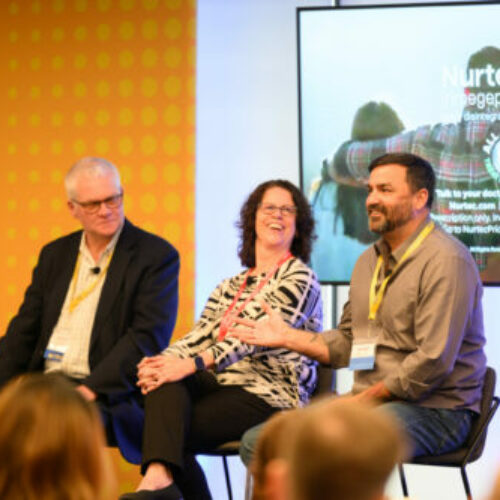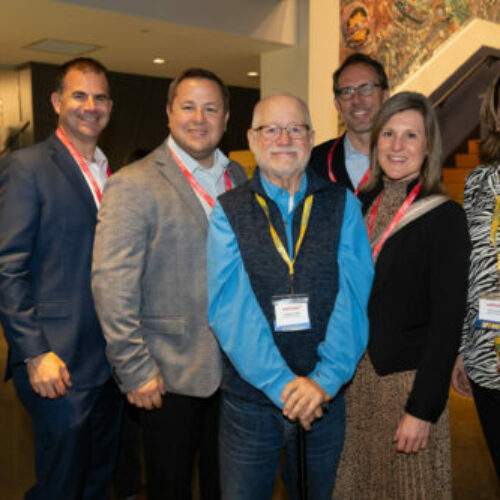REASONS TO CONVENE

Discover new solutions
See how other customers have moved with certainty through development with “new to you” solutions.

Dive deep into your core product
Find your tribe and learn directly from product owners during Day 2 user group meetings.

See the future
Where is biosimulation headed next? Will we ever automate our way to full data standardization? Find out from thought leaders inside and outside of Certara.

AI in Drug Development
Can GPTs speed compound identification? Where is biosimulation headed next? What's new in regulatory submissions? Find out from thought leaders inside and outside of Certara.
our schedule
Building on the success of Certainty events held around the world in 2024, Certainty 2025 will focus on how the model-informed drug development (MIDD) community is expanding its global reach and impact. This year’s program will showcase the latest science, technologies, case studies, and the tangible value MIDD is delivering across the industry.
The agenda will feature expert-led lectures and dynamic panel discussions covering real-world MIDD applications, emerging regulatory trends, and cutting-edge technologies—all presented by industry leaders and distinguished guest speakers.
Greater Certainty in Drug Discovery and Development
As drug development becomes increasingly complex and the regulatory environment continues to evolve, the need for earlier, smarter decisions has never been more urgent. Together with our clients, Certara is leading the shift toward predictive, and data driven R&D—empowering scientists to transform data into knowledge faster than ever and identify the most promising drug candidates earlier in the process.
Attendees will gain insight into:
- Why regulatory and industry trends are accelerating the adoption of biosimulation and in silico approaches
- How AI-driven technologies are reshaping every stage of the drug development lifecycle
- The latest innovations from Certara and their impact on decision-making and speed to market
Speaker: William Feehery, CEO, Certara
Keynote Session: Accelerating Drug Development – A Vision for 2030
AstraZeneca’s commitment to deliver 20 new medicines by 2030 is driving a fundamental transformation in how the company approaches R&D. This keynote will explore how that ambition is reshaping decision-making, accelerating technology adoption, and fostering deeper collaborations. Through the strategic integration of modeling and simulation, AI, and digital data flows, AstraZeneca is building a more agile, predictive, and sustainable development model. This session will highlight practical examples of how these innovations are advancing scientific discovery, strengthening organizational leadership, and increasing the likelihood of success in bringing new medicines to patients.
Revolutionizing Drug Development: The Transformative Role of Biosimulation in Enhancing Innovation and Efficiency
As the adoption and utility of biosimulation in drug discovery and development grows, the supporting technology, use cases, and scientific applications are rapidly evolving. This session will highlight how an integrated, AI-enabled modeling and simulation platform can deliver deeper predictive insights and workflows from across discovery, preclinical and clinical phases of development.
Speaker: Robert Aspbury, PhD, President, Certara Predictive Technologies
Driving Smart Decisions from Discovery to the Clinic
This panel will highlight how modeling can support decision making across phases of development. What early decisions are created, how is that information and insight tracked and shared with others? Both mechanistic and empirically based decision making will be discussed as well as regulatory perspectives and expectations along with impact to other decisions and stakeholders.
Moderator:
Piet van der Graaf, PharmD, PhD, Senior Vice President, Quantitative Systems Pharmacology
Speakers:
Stefano Zamuner, Vice President of Clinical Pharmacology and Quantitative Medicine (CPQM), GSK Respiratory, Immunology, and Inflammation Research Unit
Stefan Platz, Senior Vice President and Global Head, Clinical Pharmacology & Safety Sciences, AstraZeneca
Dr. Andrea Manfrin, Deputy Director of Clinical Investigations and Trials, MHRA
Shift in Regulatory Approaches to Support Totality of Evidence Thinking
This session will explore how regulatory evolution is enabling a broader, more integrated approach to drug development, one that embraces the Totality of Evidence (ToE) by incorporating clinical data, New Approach Methodologies (NAMs), and modeling and simulation. This broadened regulatory thinking is creating new opportunities to accelerate development and improve decision-making. Experts will share perspectives on this shift and preview real-world case studies that illustrate how ToE is being applied in practice to support more innovative and efficient drug development pathways.
Speakers:
Eva Berglund, PhD, Senior Director, Regulatory Strategy and Clinical Pharmacology, Certara Drug Development Solutions
Justin Hay, PhD, Senior Director, Regulatory Strategy and Clinical Pharmacology, Certara Drug Development Solutions
NAMs in Action: Real-World Progress and Future Directions in Nonclinical Safety
As the pharmaceutical industry shifts toward more predictive and ethical approaches in nonclinical safety, New Approach Methodologies (NAMs) are gaining momentum. But how are they really being used today and what’s next? In this session, we’ll explore findings from recent cross-industry insights on the adoption of NAMs, including barriers, opportunities, and the path to regulatory confidence. Hear from industry leaders as they discuss real-world applications of NAMs in drug development, strategies for integrating these tools alongside traditional methods, and how to advance science while reducing reliance on animal studies with quantitative strategies for predicting safety in vulnerable populations such as pediatric and breastfeeding patients, and how these methods can complement clinical data. We’ll highlight how NAMs can inform dosing, safety, and efficacy decisions while reducing reliance on juvenile animal and lactation nonclinical studies. This conversation will highlight what’s working, what’s still needed, and how to advance science in a way that is both clinically relevant and ethically responsible as safety science evolves.
Speakers:
Helen-Marie Dunmore, PhD, Senior Director, Toxicology, Certara Drug Development Solutions
S.Y. Amy Cheung, PhD, Vice President – Europe/APAC regional Quantitative Science LeadVice President – Europe/APAC regional Quantitative Science Lead, Certara
Leveraging Modeling and Simulation to Accelerate Drug Development and Regulatory Success
This session explores how advanced modeling and simulation approaches are transforming drug development by enabling faster, more informed decisions and regulatory alignment. We will highlight three case studies illustrating the breadth and impact of these tools. The first showcases how physiologically-based pharmacokinetic (PBPK) modeling was used to address drug-drug interaction (DDI) questions for niraparib, a PARP inhibitor, in lieu of clinical studies, leading to model-informed labeling language adopted by Health Canada. The second examines how Model-Based Meta-Analysis (MBMA) synthesizes data across clinical trials to inform dose selection, benchmark efficacy, and optimize trial design, especially where traditional comparative data are unavailable. A third presentation will focus on the application of pharmacometrics to support development strategy, enhance decision-making, and address specific regulatory questions. Collectively, these talks underscore how quantitative pharmacology enables innovation, efficiency, and confidence in global drug development.
Panelists:
Rik de Greef, MSc, SVP, Global Quantitative Sciences Services, Certara Drug Development Solutions
Mirjam Trame, VP, Certara Drug Development Solutions, Head of Pharmacometrics USA – Division II
Paul Matthias Diderichsen, SVP, Quantitative Science Services (Europe/Africa)
Gareth Lewis, PhD, Director in PBPK Modelling, DMPK, UK, GSK
Driving innovation in regulatory science with advanced technologies
Regulators including MHRA are increasingly taking a totality of integrated evidence approach and collaborating across the industry to support innovative frameworks that align with regulatory objectives. This talk will share a vision for model-informed evidence (MIE) and model-informed drug development (MIDD) along with practical applications of these approaches that improve the safety, quality, and speed of clinical trial applications, assessments, and authorizations.
Speaker: Dr. Andrea Manfrin, Deputy Director of Clinical Investigations and Trials, MHRA
From Data to Decision: Standardization, Automation, and Cloud Infrastructure
Biosimulation can bring us to the starting line of clinical trial faster. But that’s no time to slow the pace. With the right technology working in concert from “data in” to “report out”, studies can reach their many analysis points in quicker succession. In this presentation, four Certara product leaders will share a vision and practical examples of data flow. You’ll see how standardization and automation work hand-in-hand as data arrives from third parties, gets prepared for PK analysis, shaped into CDISC-conforming tables, and summarized with a GenAI-powered regulatory writing platform. We’ll also provide an update on the infrastructure that makes all of this possible, Certara Cloud.
Martin Snyder, President, Certara Data Science Software
Erin Erginer, Senior Director of Product, Pinnacle 21
Fred Mahakian, Senior Director of Product, Phoenix
Nick Brown, Director, Global Portfolio Leader
FIRESIDE CHAT: THE DIGITAL DATA FLOW FROM PROTOCOL TO SUBMISSION
Have we reached a tipping point in the effort to digitalize clinical trials? With the rise of metadata repositories to standardize data at the point of acquisition, to the AI-powered drafting of eCTD reports, the right technology now exists to support a truly digital data flow. But technology alone can’t unite data collection, analysis, and reporting. Industry standards—such as the Unified Study Definitions Model (USDM)—must provide a common language for digital protocols to flow seamlessly across systems, functions, and stakeholders.
This session will explore how USDM supports automation, standardization, and system interoperability—helping organizations reduce cycle times, increase data quality, and improve submission readiness. Drawing on current trends and frameworks from TransCelerate and CDISC, the discussion will focus on high-impact strategies for leveraging USDM to future-proof trial operations and drive enterprise-level value.
In conversation: Peter Van Reusel, Chief Standards Officer, CDISC CDISC and Erin Erginer, Senior Director of Product, Certara
Conclusions for CERTAINTY 2025 EMEA
Client Appreciation & Phoenix Cloud Premiere Party at the Jacqueline Barcelona
Location: Jacqueline Barcelona
Certara demos and strategy sessions
Room: Berlin
| 10:30- |
12:30- |
13:00- |
15:00- |
|
|---|---|---|---|---|
| D360™ | ||||
| Drug Interaction Database (DIDB®) | ||||
| SEND Explorer® | ||||
| Phoenix® | ||||
| Phoenix Cloud | ||||
| Toxicology/New Approach Methodologies (NAMs) | ||||
| Certara.AI | ||||
| Pinnacle 21® | ||||
| Drug Development Strategy | ||||
| Clinical Pharmacology & Regulatory Strategy | ||||
| Simcyp®/QSP | ||||
| Pirana® Darwin | ||||
| Drug Interaction Science | ||||
| Global Market Access |
Concurrent Morning Sessions
Plenary Session
Phoenix Training
The Innovation Circle
In this session the audience and judges will view and engage with the latest innovations across Certara. Judges and the audience will share their impressions and provide feedback helping to shape the future of new solutions.
Innovative Solutions featured:
- Trial Simulator - Fred Mahakian, Sr. Director Product, Phoenix Portfolio
- Digital Dataflows from Protocol to Submission - Erin Erginer, Senior Director of Product
- OptiDose - Olivier Luttringer, PhD, Distinguished Scientist, Certara
How to Simulate Steady-State Profiles from a Single Dose
(Using Non-Parametric Superposition and WinNonlin Modeling)
Trainer: Ana Henry, Executive Director, Training and Certara University
This hands-on workshop will demonstrate how to simulate steady-state concentration-time profiles using single-dose data in Phoenix WinNonlin. Participants will learn how to apply Non-Parametric Superposition (NPS) and compartmental modeling approaches to predict steady-state behavior, compare results, and explore key assumptions behind each method. Whether you're new to simulation or looking to refresh your skills, this session will provide practical guidance on steady-state predictions using Phoenix tools.
Key topics include:
- Introduction to Non-Parametric Superposition (NPS)
- Simulating steady-state using compartmental models
- Interpreting and comparing simulated profiles
Requirements:
Working knowledge of Phoenix WinNonlin NCA
Networking break
Breakout Tracks
P21 User Group Meeting
Phoenix User Group Meeting
Failure to Launch: Smarter Strategy to Get the Right Drug to the Right Patient
10:30 - 11:00 – The Pinnacle 21 Vision: Our Near- and Long-Term Roadmap
Erin Erginer, Senior Director of Product
A strategic look at the unified product roadmap across Pinnacle 21 and ryze. Erin will highlight recent and upcoming innovations, including a new Rules Editor for customizable validation, enhanced metadata management capabilities, support for mapping specifications to streamline dataset standardization, and a solution to standardize eCRF and study builds. The session will also cover improvements to data exchange, foundational platform enhancements, and the broader vision for an integrated ecosystem designed to accelerate submission readiness and data quality. See what we’ve accomplished since last year, what the next 12-18 months will bring, and where we want to go in the future.
11:00 - 11:30 - The Case for Standardizing Forms
Martin Johnston, Solutions Consultant
Traditional approaches to Electronic Data Capture in clinical trials are often inefficient, fragmented, and burdensome for both data management teams and downstream stakeholders in biostatistics and programming. Disconnected processes result in redundant work, inconsistent data structures, and bottlenecks in the clinical data pipeline. These inefficiencies introduce challenges for mapping and validating data, which can delay submission readiness and regulatory review.
Martin will examine the systemic pain points of existing data collection workflows, highlighting how ad hoc form design and lack of standardization amplify complexity across trial operations, and explore ways to leverage standardization to harmonize how trial data is captured, mapped, and transformed. By introducing greater uniformity and automation into the pipeline, organizations can reduce manual rework, improve data quality, and accelerate the path to regulatory acceptance.
11:30 - 12:00 - Higher Standards: Management and Oversight of Custom Standards, Change Requests, Versions, and Approvals
Gilbert Hunter, Senior Customer Success Manager
Managing study data standards is a critical responsibility for Data Standards professionals, yet many lack the tools to review, approve, and track changes to their organization-specific standards and terminologies. Without governance and traceability, inconsistencies can affect downstream compliance and submission readiness.
Gilbert will demonstrate how P21E empowers study teams to take ownership of their metadata through features such as branching, inheritance, and version control. Learn how to jumpstart your custom standards by inheriting from existing regulatory or other standards, adapt them to study-specific needs, and maintain transparent, traceable histories of all changes. Leverage the ability to create an organization-wide "library" of custom standards that can be shared and reused by other study teams—driving consistency, efficiency, and compliance across both current and future clinical trials.
10:30 - 11:00 Product Overview, Vision, and Roadmap
Fred Mahakian, Sr. Director Product, Phoenix Portfolio
This session offers a present- and forward-looking view of the Phoenix Platform, focusing on its long-term vision and strategic roadmap. Following an exploration of what's next in Phoenix 8.6, we’ll share how the product is being reimagined to meet emerging needs, modernize its foundation, and support future innovation—while staying true to its core strengths.
With decades of legacy behind it, Phoenix is entering a new phase of evolution. Join us to see where Phoenix is now, where it's headed, headed and how we’re preparing it for what’s next.
11:00 - 11:30 Phoenix Cloud Walkthrough
With growing study complexity, tight timelines, and a shortage of skilled personnel, research teams need tools that make workflows fast, flexible, and frictionless. Guided by your input, we’re answering the call. Phoenix Cloud integrates our AWS-hosted solutions for analysis and modeling with cloud-native modules for data management, publication-ready graphing, GenAI-powered reporting, and more.
Let our team give you the tour from data ingestion to report production!
11:30 - 12:00 Panel Discussion - Voices from the Field: Tackling Process Automation in PK/PD Analysis
Discover how your peers are combining technology and hard-won wisdom to bring speed and consistency to common analyses.
Ana Henry, Executive Director, Training & Certara University (moderator)
Dr. Fabian Gärtner, Team Lead PK/TK Evaluation and Data Management, Bioanalysis, Nuvisan GmbH
Maria Learoyd, Head of Clinical Pharmacokinetics, Clinical Pharmacology and Quantitative Pharmacology, AstraZeneca
Catarina Pintassilgo, Scientist, Biolanalytical Sciences - Translational Medicine, Immunocore
10:30 - 10:45 - Failure to Launch: The Hidden Cost of Poor Strategy
This session sets the stage by exploring why so many promising therapies never reach patients. With only ~40% of approved drugs recouping their development costs, the stakes are high, and the root cause is often strategic, not scientific. We’ll examine how early misalignment across scientific, regulatory, and commercial functions leads to costly inefficiencies and missed opportunities. Attendees will learn to identify these blind spots early and how integrating biosimulation, regulatory foresight, and a compelling business case improves both development outcomes and investor readiness. This session also highlights how data-driven development plans can build confidence with stakeholders and unlock critical funding at each stage of the journey.
Speaker: Fran Brown, PhD, Global Head Drug Development Science
10:45 - 12:00 - Getting the Right Clinical Candidate
Selecting the right clinical candidate is one of the most pivotal decisions in drug development. This session explores how model-informed translational strategies, especially Quantitative Systems Pharmacology (QSP), can be used to pressure-test the mechanism of action, predict downstream performance, and evaluate whether the candidate has the right attributes to succeed in the clinic. We’ll also discuss the probability of pharmacological success and how integrating scientific modeling with early development strategy helps avoid false starts, prioritize assets with the strongest potential, and set the foundation for an efficient and successful development trajectory.
Speakers:
Pablo Morentin Gutierrez, Director of Translational PK/PD, AstraZeneca
Piet van der Graaf, PharmD, PhD, Senior Vice President, Quantitative Systems Pharmacology
Arne van Schanke, PhD, Director, Early Development, Certara
Stefano Zamuner, Vice President and Head, Clinical Pharmacology Modelling & Simulation, GSK
Breakout Tracks Continued
P21 User Group Meeting
Phoenix User Group Meeting
Failure to Launch: Smarter Strategy to Get the Right Drug to the Right Patient
13:00 - 13:30 - Bidirectional Metadata Mapping from Source to Target SDTM
Martin Johnston, Solutions Consultant
Mapping source metadata to SDTM has long been a complex and error-prone process, often requiring manual effort, disconnected tools, and extensive rework to meet regulatory expectations. This presentation will provide an overview of the traditional challenges that study teams encounter when aligning clinical trial data to CDISC standards. We will then demonstrate how Pinnacle 21 Enterprise Plus streamlines the mapping process, with examples of common mapping scenarios and practical approaches to handling them within the platform. Finally, we will highlight how P21E’s collaborative features—such as built-in communication, traceability, and shared visibility—support efficient data standardization and validation, ultimately enabling more consistent, submission-ready datasets for regulatory agency review.
13:30 - 13:45 - Break
13:45 - 14:15 - Tips for a Successful Implementation
Shaun Wilcock, Associate Director, Solutions Consultant
Implementing a new Metadata Repository can be a challenging process, often complicated by shifting requirements, stakeholder alignment, and the need to adapt existing practices to new technology. Many organizations struggle with balancing the technical demands of configuration and migration with the human aspects of adoption and training.
Shaun will share practical tips for achieving success during implementation of a new MDR tool like P21E, and introduce a simplified, phased approach that breaks the process into three clear stages: Foundation, Translation, and Execution. By structuring implementation in this way, organizations can reduce complexity, drive stakeholder engagement, and increase the likelihood of sustainable long-term success.
14:15 - 14:45 - P21’s REST API: Unlocking Metadata Driven Programming
Gilbert Hunter, Senior Customer Success Manager
Ensuring that clinical trial datasets align with the programming specification is a core requirement for regulatory compliance, yet the process is often manual, time-consuming, and prone to error. P21 Enterprise's REST API allows programmers to automate and streamline this workflow directly from their code.
In this session, Gilbert will demonstrate how to use the API to set up variable-level attributes, assign dataset labels, manage keep/drop variables, and dynamically generate formats for code and decode variables—all driven from the dataset specification.
13:00 - 14:45 User Feedback Session
This interactive session is your chance to share your ideas for how to make Phoenix even better. We will have a feedback-driven conversation about what’s working, what’s not, and what you'd love to see next in Phoenix. Through some creative prompts, we’ll gather insights straight from the people who know the software best—you! Come ready to speak up, vote, laugh, and help shape the future of Phoenix in a fun and collaborative environment.
14:45 - 15:00 Adjourn
13:00 - 13:30 - Evaluating Therapeutic Potential
Getting the dose right is more than a regulatory checkbox, it’s central to unlocking a therapy’s full value. In this session, we’ll explore how biosimulation models support smarter dose selection, optimize trial design, and predict drug behavior across diverse patient populations. You’ll see how integrating these approaches early helps reduce trial failure risk, accelerate decision-making, and improve the chances of clinical and regulatory success. Real-world examples will show how model-informed drug development strategies have shortened timelines, reduced costs, and increased confidence in key program decisions.
Speakers:
Amandine Manon, PharmD, Senior Director, Clinical Pharmacology & Translational Medicine
Justin Hay, PhD, Senior Director, Regulatory Strategy and Clinical Pharmacology, Certara
13:30 - 14:15 - Preparing for Commercial Success
Success doesn’t stop at approval. This session explores the importance of planning for reimbursement and market access starting as early as Phase 2, if not before. We’ll discuss how integrating regulatory and commercial evidence requirements into your development strategy ensures you generate the right data to support pricing, access, and adoption globally. From aligning with HTA bodies to building Totality of Evidence frameworks, this session will show how smart planning and cross-functional evidence generation can significantly improve your launch trajectory, reduce late-stage surprises, and increase the likelihood of commercial success.
Speakers:
Vishwas Agashe, PhD, MSc, Associate Principal, Global Market Access, Pricing & Reimbursement, Certara
Sanja Stanisic, MSc, MIHMEP, Director, Certara Evidence & Access
Closing/departure
Certara demos and strategy sessions
Room: Berlin
| 12:00- |
12:30- |
|
|---|---|---|
| D360™ | ||
| Drug Interaction Database (DIDB®) | ||
| SEND Explorer® | ||
| Phoenix® | ||
| Phoenix Cloud | ||
| Toxicology/New Approach Methodologies (NAMs) | ||
| Certara.AI | ||
| Pinnacle 21® | ||
| Drug Development Strategy | ||
| Simcyp®/QSP | ||
| Pirana® Darwin | ||
| PK Submit® |



